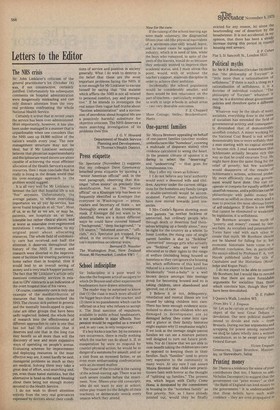The NHS crisis
Sir: John Linklater's criticism of the general practitioner's lot (October 18) was, if not constructive, certainly justified. Unfortunately his subsequent comments on hospital administration were dangerously misleading and can only distract attention from the very real problems confronting the whole National Health Service.
Certainly it is true that in recent years the service has been over-administered. More importantly, however, it has also been under-managed in a manner that is unpardonable when one considers that the NHS uses up E4,000 million of the nation's wealth every year. The new management structure may not be ideal, but if Mr Linklater seriously believes that physician superintendants and disciplinarian ward sisters are alone capable of achieving the most efficient allocation of the Health Service's scarce resources, then I must conclude that he really is living in the dream world that his over-nostalgic approach to the problem would suggest.
It is all very well for Mr Linklater to bemoan the fact that hospital life is not "fun" anymore. Unfortunately, the average patient, to whose overriding importance we all pay lip-service, has never found hospitals at all "fun". Most of us, in so far as we are, or may be, patients, see hospitals as, at best, tolerable but rather clinical places, and at worst as miserable over-regimented institutions. I return, therefore, to my original point about allocating resources. The whole field of community care has received not half the attention it deserves throughout the history of the NHS If money and research were diverted to the improvement of facilities for treating patienta at home rather than in hospital, then it would lead to an overall saving of money and a very much happier patient. The fact that Mr Linklater's article only mentions community services in relation to GPs' contracts is an indication of the overt hospital bias of his views.
Of course, community care is only one example of the maldistribution of resources that has characterised the NHS. The chronic sick patient in general and the mentally handicapped in particular are other groups that have been sadly neglected. Indeed, the whole field of research into the effectiveness of different approaches to care is one that has not had the attention that it deserves and one that in the long run may benefit us all more than will the discovery of new and more expensive ways of operating on people's aortas. Evaluating schemes for improvement and deploying resources in the most effective way are, it need hardly be said, managerial problems as much as they are medical. Solving them may take a great deal of effort, soul-searching and, yes, even those hated statistics, but the alternative is head-in-the-sand bleating about there being not enough money devoted to the Health Service.
I do not wish to divert attention entirely from the very real grievances expressed by doctors about their condi tions of service and position in society generally. What I do wish to destroy is the belief that these are the most important problems facing the NHS. It is not enough for Mr Linklater to excuse himself by saying that "the malaise which afflicts the NHS is not all related to personal comfort, pay and prerogative." If he intends to investigate the real issues then vague half-truths about "faceless administration" and a succession of anecdotes about hospital life are a positively harmful substitute for objective criticism. The NHS deserves a more searching investigation of its problems then-this.
J. G. V. Howard Department of Health Service Planning and Development,' St Thomas's Health District.
































 Previous page
Previous page